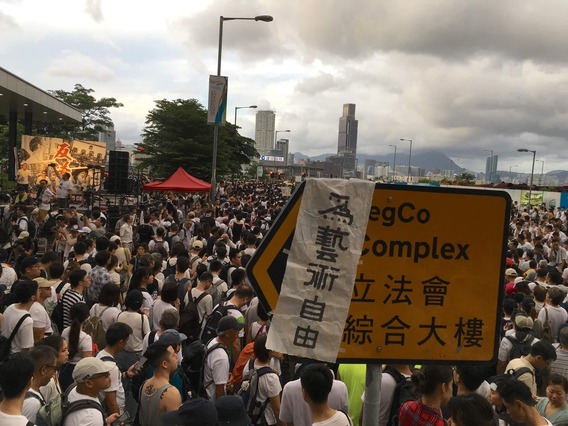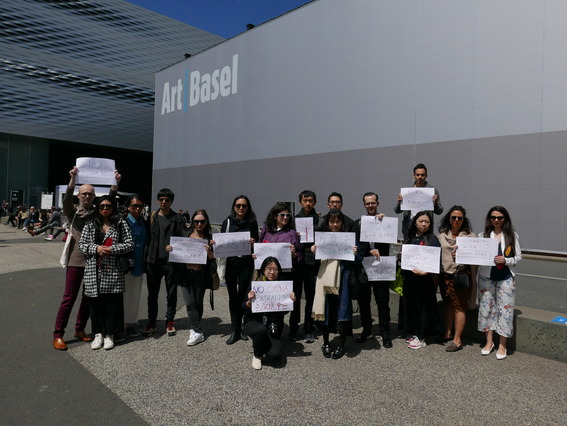
R
E
V N
E
X
T
Hong Kong Artists Join Mass Protests Against Extradition Bill
On June 9, an estimated one million people—artists, curators and cultural workers among them—took to the streets of Hong Kong to protest a proposed extradition bill put forward by the Security Bureau, which was scheduled to be read at a Legislative Council session on June 12. If passed as law, the bill would grant Hong Kong’s chief executive the authority to bypass the Legislative Council in endorsing the extradition of alleged criminals from Hong Kong to mainland China and Taiwan. Many fear that the bill will be abused by the Chinese Central Government for political ends, and that targeted citizens will be subject to the mainland’s human rights abuses. Just hours after the protest began, current chief executive Carrie Lam issued a statement affirming that the June 12 reading of the bill would proceed as planned, further riling those in attendance.
On June 11, the Hong Kong Artist Union began to circulate an open letter calling for the city’s cultural institutions to join a strike on the day of the reading, where, independently, a mass protest was also organized next to the Legislative Council. In their open letter, the Union states: “At this critical juncture, we . . . call upon the cultural institutions of Hong Kong to stand in solidarity with the city, and to respond to the Hong Kong Artist Union’s call for strike . . . We urge the cultural institutions of Hong Kong to consider suspending its operation on June 12, and to make such arrangements that would allow its employees to take part in the strike should she/he so choose.”
Local institutions and platforms that officially joined the strike include Asia Art Archive and Para Site. Tai Kwun Centre for Heritage and Arts announced that the JC Contemporary gallery would operate with limited capacity. The Hong Kong Arts Centre remained open but actively welcomed protesters in need of water and first aid as their venue is close to the Legislative Council building. Commercial galleries such as Ben Brown Fine Arts, Simon Lee, Lehmann Maupin, Gallery Exit, Puerto Roja, Karin Weber Gallery and Galerie Ora-Ora closed their doors for a day. Henrietta Tsui, director of Galerie Ora-Ora, explained her decision to close the gallery in order to allow her staff to strike or protest: “Freedom of speech and expression is key for artists and galleries. I love Hong Kong and China, the city and the country are our origin, we just need more time to discuss and debate about the bill and not to be hurried into approval.”
Artists initiated various actions in solidarity with the one million who continued the demonstration on June 12. May Fung, a respected video pioneer and founder of the platform Art and Culture Outreach, was among 23 practitioners from the fields of literature, dance and theater, who went on a 24-hour hunger strike. Another group of ten artists including conceptualist Luke Ching and performance artist Sanmu Chen sat along the harborfront of Tsim Sha Tsui in quiet protest, while others joined the crowds outside the Legislative Council, where some protestors, attempting to penetrate the building, hurled various objects at the police, and faced tear gas, pepper spray and rubber bullets deployed by police forces.
Abroad, the Hong Kong diaspora and those close to the city enacted their own forms of protest on June 12 in solidarity with the anti-extradition movement. At the 58th Venice Biennale, a notice was posted at the Hong Kong pavilion, curated by Christina Li and featuring Los-Angeles-based artist Shirley Tse. It read in English and Italian: “Due to unforeseen circumstances, the exhibition Shirley Tse: Stakeholders, Hong Kong in Venice will be closed on June 12, 2019. Please excuse us for the inconvenience.” Li, along with other cultural workers who were in Basel, Switzerland, for the annual art fairs—including Hong Kong-based artist Nadim Abbas and Australian curator Alexie Glass-Kantor—gathered at Art Basel’s Messeplatz with signs to show their support. Hong Kong-based artist Trevor Yeung, who was presenting new artworks at Liste art fair in Basel, covered his installation Red Brighter (2019) with a white cloth upon which was written: “Artist decides not to show this work in order to protest Hong Kong-China extradition bill.”
The reading of the bill was eventually postponed on June 12, and as of June 13 the demonstrations are ongoing. When asked what he thought is at stake for artists with the bill, artist Samson Young responded: “It’s very simple, freedom of the mind and an imagination that is without inhibition define and sustain absolutely everything that we do as artists, so everything is at stake.”
Ysabelle Cheung is the managing editor of ArtAsiaPacific.
Chloe Chu is associate editor of ArtAsiaPacific.
To read more of ArtAsiaPacific’s articles, visit our Digital Library.













